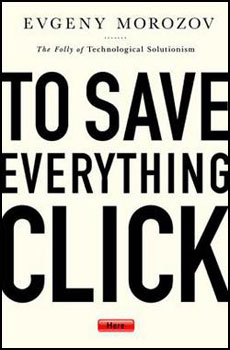"The growing appeal of self-tracking, nudges, gamification [the trend toward introducing so-called game mechanics — the use of badges, points, levels, rewards, and virtual currencies — into diverse social practices], and even situational crime prevention and digital preemption can only be understood in the broader intellectual context of the last few decades. As already noted, the sad reality is that philosophy, with its preoccupation with virtue and the good life, has been all but defeated by psychology, neuroscience, economics (of the rational-choice variety), and their various combinations, like behavioral economics. Hence, instead of investigating and scrutinizing the motivations for our actions, trying to separate the good ones from the bad, policymakers fixate on giving us the right incentives or removing the option to do the wrong thing altogether. Better safe than sorry, as the saying goes.
"Of course, even within philosophy it's no longer fashionable to talk about virtue and the good life; those who do are viewed as die-hard conservatives. Rare exceptions like Michael Sandel and Martha Nussbaum do exist, but they only prove the rule: the politically correct liberal ideology that dominates both our public and our academic debates holds that the individual alone is to decide questions of the good life. As a result, our philosophers have come up with numerous theories about the best way to distribute goods, but they have very little to say about how to value them. Yet, what Michael Sandel has written of markets fully applies to technology as well: 'Our reluctance to bring competing conceptions of the good life into political debate has not only impoverished our public discourse; it has also left us ill equipped to contend with the growing role and reach of markets in our lives.'
"It's not that self-tracking and gamification make our lives less pleasant — for all we know, we might be enjoying the games we play; it's that they make our lives less meaningful, less compatible with the quirks and demands of the human condition. Such schemes might still be stunting our personal and political growth, even if they do allow food companies to launch new nutritional supplements with the help of our bodies and technology companies to test their new apps with our fingers. Is it naive to suppose that there's more to life than tracking the efficiency of nutritional supplements and testing the performance of gaming apps?"
